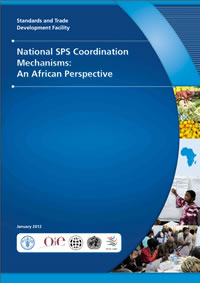
Food safety is a growing public health problem, and institutions across the world are required to work together to ensure that animal health, plant health and food safety regulations are duly applied.
A new study, 'National SPS Coordination Mechanisms: An African Perspective' will support private and public stakeholders in developing countries to implement Sanitary and Phytosanitary (SPS) standards in accordance with the Agreement on the Application of SPS Measures, an international treaty of the World Trade Organisation. The study is written by the Standards and Trade Development Facility (STDF), based at the World Trade Organisation in Geneva, in association with the Natural Resources Institute (NRI), University of Greenwich, UK.
All countries maintain measures to ensure that food is safe for consumers, and to prevent the spread of pests or diseases among animals and plants. These sanitary (human and animal health) and phytosanitary (plant health) measures take many forms, including: disease-free production areas, product inspection, specific treatment of products, and pesticide and food additive regulations. These measures are applied to both domestic and imported products.
However, the large number of public and private stakeholders involved has created challenges for the effective coordination of SPS. Hence the objective of the new study was to extract lessons learned and provide suggestions and guidance to support the further establishment and operation of future national SPS coordination mechanisms.
The report presents and analyses the findings of a survey carried out by the STDF in 2010 to examine how existing national SPS coordination mechanisms in Africa function, as part of the Participation of African Nations in SPS Standard-setting Organisations (PAN-SPSO) project. PAN-SPSO carried out activities on the importance of improved SPS coordination and provided support for the establishment and operation of national SPS committees.
Key factors were identified to help enhance sustainability of existing committees, including: ownership and commitment of the organisations, formalisation of institutional arrangements, a practical and workable design and structure, adequate resource provision, and capacity building.
This work complements a recent STDF publication on Regional SPS Frameworks and Strategies in Africa, which provided a preliminary analysis of the current and potential role of the African Union Commission and the Regional Economic Communities in the SPS area.

